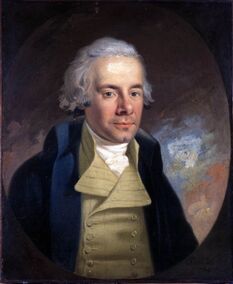 By WCS Headmaster Dr. Roger Erdvig In the latter half of the 1700’s, England was in a cultural death spiral. British slave-trading vessels shipped human cargo across the Atlantic, one in four women in London was involved in sex occupations, and bear-baiting was an accepted form of entertainment. It was in the midst of this culture that William Wilberforce became a giant of a Godly influencer, helping to stem the tide of depravity that marked late Georgian England. But how did he come to have such profound influence? As a boy, Wilberforce enjoyed all the benefits of a wealthy, deistic, and influential family, and his path in life seemed sure. However, when he was 9 years old, his father died and his mother sent him to live with his aunt and uncle, trusting that they would continue to prepare him for a life of privilege and worldly influence.
William’s aunt and uncle were wealthy and their social circle exposed him to high culture. But in place of the insipid and socially acceptable deism of his mother, they were truly serving Jesus in the midst of a dark culture. Living with them influenced young William to commit to a life of Christian discipleship. John Newton, the former slave ship captain and one of the most famous preachers of the day, used to visit their home regularly. The man who would eventually pen the beloved hymn "Amazing Grace" became like a father to William and spent many hours sharing his life and testimony with him. When William’s mother discovered the spiritual fervor of his aunt and uncle, she quickly removed him from their care. He was only 12. As a deist, William’s mother did everything she could to extinguish his faith, encouraging a life of wasteful consumption and excessive entertainment. He maintained his faith until he entered Cambridge University at age 16, where he embraced a hedonistic lifestyle. William the university student was successful, and the force of his personality coupled with his blue-blood connections got him elected to Parliament at just 20 years of age, where he continued to feed his excessive habits. At the age of 25, Wilberforce reconnected with an old friend, Isaac Milner, who had been the headmaster at his grammar school. Since that time, Milner had risen in academia to become an esteemed professor at Cambridge. Not long after they rekindled their friendship, Wilberforce unhappily discovered that Milner was a deeply devoted Christian. They debated the validity of faith in Christ for days, and as they did, God drew Wilberforce’s heart back to Him. After his conversion, William was in a difficult position; he had become a Christian, but his lifestyle was antithetical to a vibrant faith. Over two arduous years, he wrangled with the implications of his faith for his political career. At one point in his struggle, William remembered his old friend John Newton and visited him for counsel and prayer. Newton sympathized with his predicament but suggested that William was raised up to Parliament for “such a time as this,” and that God may use him to help heal a sick culture. William stayed in Parliament and in his diary he wrote, “God has set before me two great objectives: the suppression of the slave trade and the reformation of manners.” Many were already working for the abolition of slavery in England, but they lacked a champion in Parliament. Wilberforce became that champion and was instrumental in abolishing the British slave trade in 1808. His second great objective was not referring to manners as we often think of them, but rather to cultural morals. British culture in general did not reflect a Biblical worldview-- every sort of evil and human cruelty flourished, with the slave trade being merely the most well-known of the empire’s vices. Child labor, rampant alcoholism, and sex trafficking featured prominently as well. Wilberforce decided to address the deplorable moral state of England by “making goodness fashionable.” In contrast with the cultural habits of the day, Wilberforce sought to do good in noticeable ways: he spent time with his wife and children, he rested at home on the Sabbath, and he cared for the poor. Wilberforce’s revolution of good deeds done for the glory of God had lasting impact on western culture. Clearly, William Wilberforce’s mentors profoundly shaped his destiny. Mentors can have the same kind of influence in young people’s lives today. Recent research among young adults who have maintained the Christian faith of their childhood suggests that a key element of their staying power was in having 3-4 non-parental Christian mentors in their lives. WCS exists in part to provide a context for Godly, life-on-life influence for students. In partnership with parents and the local church, today’s WCS students are being shaped and equipped to bring radical, culture-shaping influence to the world in which we live. Who knows… perhaps the young person who will be used to end the scourge of abortion or to reform “manners” in the U.S. is sitting in our WCS classrooms today. Comments are closed.
|
Cultivating godly influencersWilmington Christian School provides a distinctively Christian, innovative education that effectively develops Godly influencers who are well prepared for life after high school and who impact the culture for Christ. Archives
May 2024
Categories
All
|
|
Wilmington Christian School provides a distinctively Christian, innovative education that effectively develops Godly influencers who are well prepared for life after high school and who impact the culture for Christ.
Wilmington Christian School admits students of any race, color, national and ethnic origin to all the rights, privileges, programs, and activities generally accorded or made available to students at the school. It does not discriminate on the basis of race, color, national and ethnic origin in administration of its educational policies, admissions policies, scholarship and loan programs, and athletic and other school-administered programs. |
|
|
© Copyright Wilmington Christian School. All Rights Reserved.
Website designed by PROSPER Creative Design
Website designed by PROSPER Creative Design


